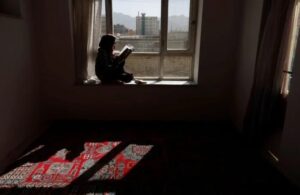KABUL (SW) – Officials at “Malali” hospital in Kabul say that at least two abnormal babies are born in this hospital on daily basis.
They state that the main reason for the birth of abnormal babies is not observing the interval between births. Malali Rahim Faizi, the director of Malali Hospital, says that among the 200 women who visit this hospital every day, 25% of them do not observe the interval between deliveries and 6% of them give birth to malformed babies.
Mrs. Faizi adds: “Break is an important principle. When a woman gets pregnant in succession, she will eventually face anomalous or incomplete pregnancy. According to the figures we have, last year 139 babies were born in this hospital.”
A number of women who have given birth consecutively and are hospitalized in the post-natal care department at Malali Hospital, say that due to not observing the interval between their deliveries, they and their baby are now facing health problems.
Rabia, who is a mother of five children and has given birth three times in a row, says that her children were born weak and underweight. She added: “My son was almost one year old when I got pregnant again. Now my son is weak, he gets sick and has pneumonia very quickly. This son of mine, who was just born, is also underweight. It is two and a half kilograms and weak.”
Niloufer, another woman who has given birth seven times, says that her four births were consecutive. She added that two years ago, she lost a baby a few days after birth.
Nilofar says: “He had health problems and was weak. That’s why he didn’t live long. It was very uncomfortable. Maybe I was not properly cleansed during pregnancy. I do not know, but when he was born, he had a health problem.”
In addition to children, childbirth without space also causes women to face health problems, which weakens their body and mind.
Shogoufa, who is 25 years old and a mother of three children, says that there was only one year between each of her births, and because of this, she is now facing severe anemia.
She added: “A child in a row is very difficult from any point of view. Due to my first child, I’m bored and on the other hand, I’m anemic. I went to the doctor several times and he says you are weak and it is because of consecutive births.”
In this report, five women have been interviewed, and all five of them say that they did not complete the period of breastfeeding their babies due to the lack of time between their deliveries.
Makiya, a doctor at Malali Hospital, says that women’s failure to observe the interval between births puts the health of babies at risk. According to her, firstly it is for the baby who is in the womb and needs energy, and the baby who has not completed the breastfeeding period, who may be a physically healthy baby but mentally, the child is not normal because in the stages when he needs energy, he doesn’t get it.”
Officials in the family planning department at Malali Hospital say that women in Afghanistan, especially in remote areas, should be informed to observe the interval between births.
Maryam, the head of the family planning department at this hospital, says that women should consider at least three years between each delivery. She added: “We counsel mothers in this hospital every day. We have several methods to create a gap between births, but there is still a need for awareness. Many of the women who come say that their husbands consider it a kind of sin to prevent them from giving birth.”
In this report, we wanted to have the opinion of the Ministry of Public Health about the awareness programs for women, but the spokesperson of this ministry refused to provide information.
ENDS








